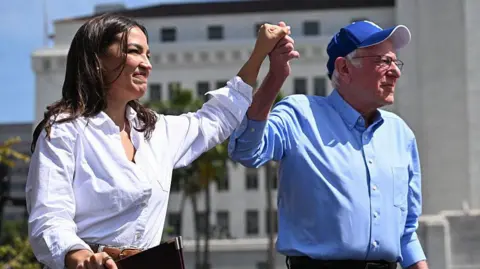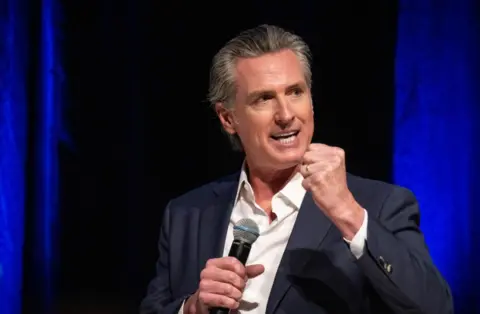What should Democrats do now? Everyone has a different answer
BBC News
 Getty Images
Getty ImagesDemocrats have struggled to land a unified message in President Donald Trump’s first months in office, with fractures both in Congress and among supporters. What comes next for a party in a difficult spot?
The rural, agricultural town of Bakersfield, California, is an odd stop for a pair of East Coast progressive politicians.
After all, Trump won the surrounding county by 20 points in the last election, and the dusty fields and endless orchards feel a world away from the party’s power centres in Los Angeles and the Bay Area.
Yet Democratic Congresswoman Alexandria Ocasio-Cortez and Independent Senator Bernie Sanders packed a local auditorium during a recent stop on their Fighting Oligarchy tour. The rally felt like a 1960s-style sit-in with attendees singing along to a gentle rendition of Woody Guthrie’s This Land is Your Land. They launched rowdy boos and jeers every time Sanders inveighed against Trump and tech billionaire Elon Musk.
The visit also felt like an answered prayer for local Democrats and left-leaning Independents who oppose Trump and his policies, while directing much of their fury at their own party, which they feel has failed to mount an effective opposition.
The Democratic party “should be doing more to try to protect everybody,” said Karla Alcantar, 26, who attended the rally. “I feel like some of them have just folded over completely, and there are some that are trying to do the work of all.”
“I definitely feel like they should be doing way more,” she said.
Democrats at a crossroads
It is not a great time to be a Democratic politician in the United States. The party is out of power. Elected officials cannot agree on a course of action to counter Trump’s agenda. No clear leader has emerged to unify the unwieldy coalition. Various ideological and generational factions are warring against each other and nobody seems to be winning.
“I understand that they don’t have the power to, like, change like things drastically, but they do have the power to slow down like things even a little bit,” said rally attendee Juan Dominguez, 26. “It honestly feels like I’m not seeing any of that.”
The anger extends beyond the rally-goers.
Fifty-two percent of Democrats and Democratic-leaning independents said their party’s leadership is moving in the wrong direction, according to a CNN/SSRS poll conducted in mid-March, as opposed to 48% who said it is moving in the right direction.
That same survey suggested a desire for strong opposition: 57% wanted Democrats in Congress to try and stop the Republican party’s agenda. It’s a complete reversal of a poll in 2017, the year after Trump first won the presidency, that suggested 74% of Democrats and Democratic-leaning independents wanted leaders to work with Republicans following a divisive election.
“What they’re pressing for is not just Democratic leaders to lash out because that’s going to make their followers feel good,” said former Pennsylvania congressman Conor Lamb, who held a town hall-style event in Pittsburgh last week.
Though Lamb said he is not currently running for office, he felt a hunger within the Democratic base.
“I think they feel like the survival of the system we have all counted on is itself on the line, and they want us to act with that level of urgency,” Lamb told the BBC. “I think it’s important for us not to forget just to be advocates for things that are specific and concrete, and really affecting people.”
Sanders and Ocasio-Cortez’s tour is just one attempt to solve that. It stops in conservative-dominated areas and remains laser-focused on the economy, citing cost of living grievances that propelled Trump to a second term, while framing him and his billionaire supporters like Musk as the culprits.
Ocasio-Cortez put the argument simply: “Oligarchy or democracy?”
 Los Angeles Daily News via Getty Images
Los Angeles Daily News via Getty ImagesBut the Fighting Oligarchy tour is only one theory about how the Democratic Party should evolve.
“It is completely normal when a party loses, especially the presidency, for there to be this period of soul searching and asking, ‘What’s next?'” said Professor Christian Grose, a political scientist at the University of Southern California.
Some Democrats accused their party of falling out of step with more conservative Americans on subjects like transgender rights, or failing to accommodate diverse viewpoints within the party’s ideological spectrum. Without widening their potential base, these Democrats argue, they stand little chance of regaining power.
One such gambit by California Governor Gavin Newsom involves moving the party’s branding more to the center. Though Newsom has long brushed off White House ambitions, he is among a new generation of Democrats who could vie for the presidency in 2028.
The governor, known nationwide as a liberal defender of abortion and LGBTQ rights, recently launched a podcast to host conversations with politicos who disagree with him.
Newsom’s decision to interview right-wing strategist Steve Bannon infuriated many Democrats.
“I think it’s important to have difficult conversations or even have a civil conversation that may be difficult for people to listen to, because everyone is out there trying to tear each other down,” Newsom said at a recent press conference.
New guard or old guard?
While such debates over whether to moderate or play to the base feature in every party’s soul-searching, this year does have a new twist, Mr Grose noted.
“Some of the questions for the Democrats’ strategy is the age question – is it time for a new generation? That is a little unique,” he said.
David Hogg, 25, a gun safety organiser and vice chair of the Democratic National Committee, is currently locked in a heated public debate with a party elder statesmen, strategist James Carville.
Hogg recently pledged $20m through his political group to fund primary challengers to Democrats in safe seats.
“We cannot win back the majority if we do not convince the American people that our party offers something that isn’t just, not Donald Trump, but something substantially better,” he said. “I think it’s time for some new voices in our party.”
Carville, credited with shepherding Bill Clinton to the White House, called the plan “insane.”
“Aren’t we supposed to run against Republicans?” he asked on CNN.
As party figures traded barbs on TV, disgruntled Democrats rallying in Bakersfield told the BBC that it doesn’t matter as much what leaders do, as long as they do something – preferably something loud.
Lisa Richards, a 61-year-old voter who drove 230 miles from San Diego, praised New Jersey Senator Cory Booker’s recent 25-hour speech on the US Senate floor opposing Trump’s policies.
That speech, and the Sanders and Ocasio-Cortez rallies are “showing people in the country that they care,” Ms Richards said.





